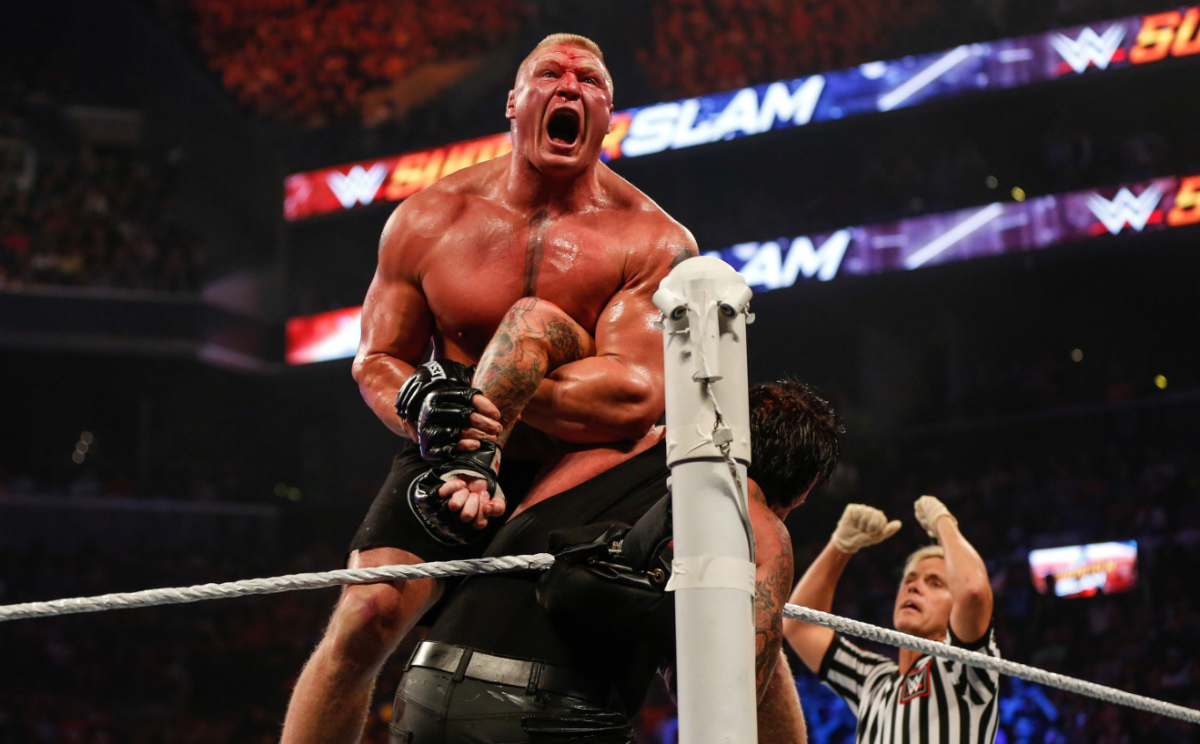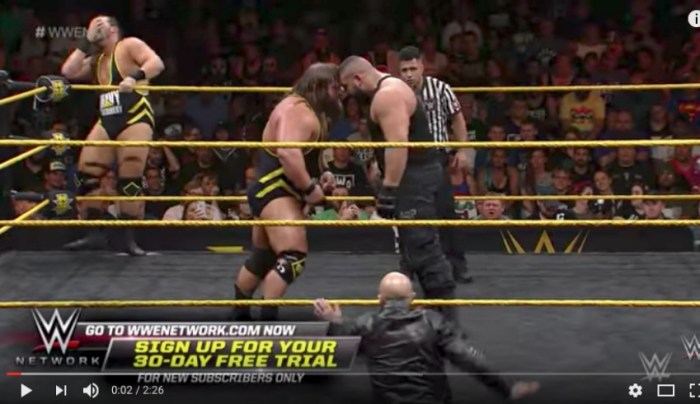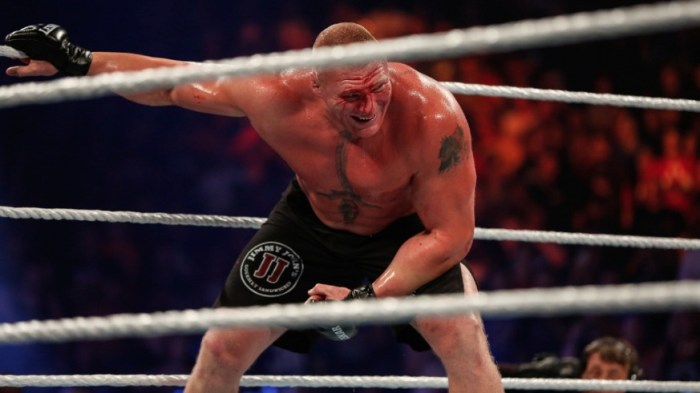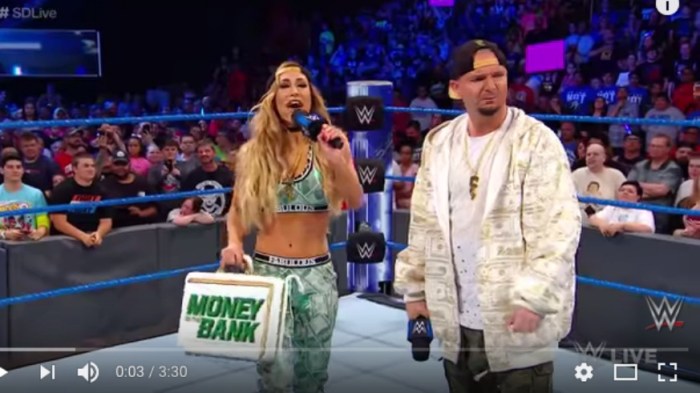I grew up in the latter days of the Rock n’ Wrestling era of WWF, where giant and powerful monsters roamed the ring and made their mark through sheer strength and dominance over lowly jobbers. Enhancement talent, or jobbers, were a useful tool in creating the air of immortality that the superstars of today can’t easily acquire. Back in the 80s and early 90s, fans would watch in awe of the destructive power and impossible perseverance of a wrestler like Hulk Hogan; who, no matter how hard a monster heel tried to beat down, would “hulk up” and come back in dramatic fashion. With the power of his Hulkamaniacs, nothing could stop Hulk Hogan in his prime. Not even Andre the Giant could stop Hogan, whose supernatural ability to get more and more powerful with the more punishment he would take, proved impossible to defeat. Andre was a truly believable giant. A mythical creature. A Titan walking among us. Hogan was more like Superman, gathering strength from the sun in the form of the will of his screaming and adoring fans when his fate was at it’s most dire point. RELATED:Roman Reigns is our high school boyfriend Hulk Hogan and Andre the Giant were Wrestling Gods. They could blast an unfortunate lower card performer across the ring with a single, exaggerated punch. And we would hang onto every strike, because we knew we were watching higher beings. These were men who transcended mortal abilities. The Ultimate Warrior was also booked this way. The difference with Warrior was that his character literally received his power from “The Gods,” whatever his Gods were. We can consider him more of a Herculean demiGod for the sake of this metaphor. On certain occasions, Ric Flair has been referred to, as well as having referred to himself as a Wrestling God. That’s fair. Not as physically dominant, but maybe a trickster God, like Loki or Hermes (WARNING: This doesn’t get less geeky). John Bradshaw Layfield used to go by the moniker of a “Wrestling God,” but he was never truly promoted that way. As much as the term might be thrown around, the true Gods were distinctive. But in the Mount Olympus of Wrestling Gods, Hulk Hogan sat atop as Zeus (not to be confused with Zeus). But as wrestling would lean toward reality in the mid90s, we would start to see a more level playing field. Wrestlers became more vulnerable, and arguably more relatable to the audience. They were more like competing gladiators. Athletes like Bret Hart and Shawn Michaels would put on wrestling clinics of backandforth competitions rather than onesided squash matches. The Wrestling Gods, higher beings placed on this earth to annihilate chumps, were stepping aside to make room for the mortals. The Jedi Order was becoming the stuff of legend. Superhumans no longer walked among us. Cut to 2002
A relatively unknown force known as Brock Lesnar smears the blood of the Immortal Hulk Hogan across his chest.
A postNWO and Monday Night War survivor Hulk Hogan would return to WWE. The landscape was a bit different, and superstars like Stone Cold Steve Austin and The Rock ruled. As dominant as they were, they weren’t seen as having unattainable, Godlike powers. But as far as Gods go, Hogan was back as a symbol of uncanny power. And thus, he would have to be usurped by a new lord. But Brock was different. Dubbed as “The Beast Incarnate” by manager, Paul Heyman, and tattooed with the face of a demon on his gargantuan back, Lesnar conjured up feelings thatLucifer had come to the WWE to destroy any remaining Gods of legend who had survived the Monday Night War. After defeating Hogan and many other top wrestling stars, Brock would, seemingly out of boredom, take his amateur wrestling expertise to the sport of MMA and turn his focus toward winning the UFC Heavyweight Title. This would only further legitimize his superhuman abilities, despite later being defeated, partly due to severe Diverticulitis, an intestinal disease that prevented Lesnar from performing at 100%. Following this diagnosis, The Beast would return to WWE. RELATED: The 2016 Rio Olympics needs pro wrestling Once Brock’s illness had been treated, he made the decision to stay in the world of Sports Entertainment, albeit reluctantly, as he felt he had unfinished business and more to prove in the octagon. But Lesnar would return more dominant and intimidating than ever. He was perhaps more powerful even than the Wrestling Gods of old. Even the sight of Brock invokes a fear in grown men (me) as we now understand the extent of his legitimate fighting ability. But there was one more legendary Wrestling God who stood before him: The Undertaker. For 25 years, The Undertaker was the Lord of Darkness and had never lost at Wrestlemania. If there was entity that still existed in the modern reality era who was perceived as unbeatable, it was The Undertaker. When the Deadman walks out the the ring, the lights go out. When he raises his arms, the lights go back on. He has demonstrated the power to summon lightning and has risen from the dead on numerous occasions. For all intents and purposes, The Undertaker was billed more than any other wrestler in history as a God. Since Wrestlemania 25, Shawn Michaels and The Undertaker set a precedent for “The Streak” match. To even wrestle The Phenom at Wrestlemania was an honor. You were going to lose, but it was an honor. Wrestlemania 30 would appear to be no different, as The Beast Incarnate would step up to challenge Undertaker’s undefeated streak. One must understand, defeating The Undertaker at Wrestlemania didn’t even seem like an option. But this is where Brock Lesnar would truly ascend to his Godlike status and become what his advocate, Paul Heyman, would later deem “The God of Violent Retribution.” At Wrestlemania 30, The God of Violent Retribution would shockingly destroy and finally defeat The Lord of Darkness. It was quite possibly the most surprising finish in the history of Pro Wrestling. This cemented Lesnar as being frighteningly indestructible. The following Summerslam, he would “victimize” John Cena, tearing through the champion to pillage the WWE Heavyweight Title. Cena had never been dominated in a main event so decisively. Brock Lesnar, The Beast Incarnate, The God of Violent Retribution, had ascended to another plain of existence. Generally speaking, most WWE Superstars are on the same level. Anyone can beat anyone on any given night. But Lesnar has that unimaginable strength, speed, and scary recklessness to suplex any other wrestler into oblivion. The only difference between Lesnar and the Wrestling Gods of old is that we live in an age without enhancement talent. There are no jobbers to make Brock Lesnar look strong. Instead, every Superstar is a jobber to Brock Lesnar. This month features an unprecedented Royal Rumble where the current title holder, Roman Reigns, will be a participant, and the winner of the Royal Rumble match will win the WWE Heavyweight Title. It’s as unprecedented as being stained in the blood of an immortal, and as unprecedented as burying the undead. And the timing couldn’t be better for the last Wrestling God to climb over twentynine mortals to claim his throne atop Mount Olympus.
Nathan Burke is a standup comedian based in Boston. He hosts the comedy podcast, “So Now I’m the Asshole” on Fans.FM
WWE Talk: Brock Lesnar is the last wrestling God

Getty Images























